- New Products
- Exclusive Gear
- Bushcraft Gear
- Containers
- Cooking
- Fire
- First Aid
- Food Gathering
- Knives & Tools
- Knife Collectors Corner
- Light
- Logo Gear
- Misc. Items
- Navigation
- Packs, Pouches & Bags
- Personal Care
- Repair Gear
- Shelter & Protection
- Signaling
- Urban Survival
- Water
- Writing Gear
- John's Books
- Bargain Bin
Are You Really Prepared?

When it comes to emergency preparedness, some people might be prepared with some supplies, but are they really prepared to survive for more than a few days? It takes more than a few supplies.
So, let's discuss how some people prepare. They buy a bunch of freeze dried food in #10 cans and set them on a shelf for 14 years. They think they are ready, but what happens when they open that can of corn, and it must be eaten within one week. That's a lot of corn! I prefer storing food that doesn't require a lot of water, but if you do store dehydrated meals, considered having some of the individual dehydrated meals for a short term situation, as you can eat the whole package. Do you have the water to re-hydrate the food?
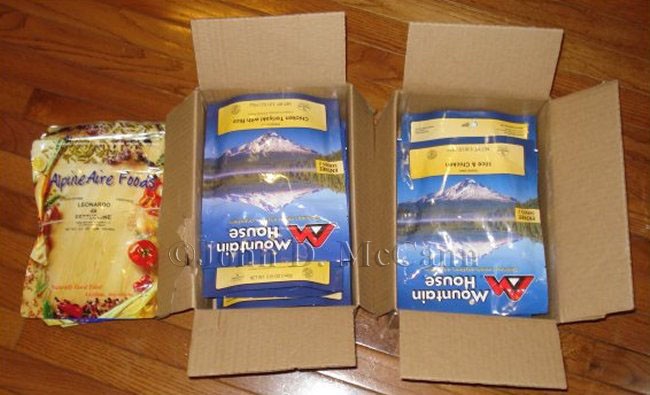 For short term survival, individual freeze dried meals can be a good idea, as opposed to #10 cans,
For short term survival, individual freeze dried meals can be a good idea, as opposed to #10 cans,
if water is available.
The first thing you should have in an emergency situation is water, or a way to obtain it. Storing water is always a good idea, even if you have a means to obtain water. We store water even though I can run my well pump with my generator. If you are in an area where you can collect rain water, I highly suggest that you do so. It can be used as is to flush toilets, and can be filtered and or purified for cooking, drinking, and for hygiene such as washing and showers. Some people like to store water in large barrels, which is fine if you never have to leave. However, if you must evacuate your location I have found that having some water stored in smaller containers allow you to take some with you. We use "Water Cubes" and have also started buying "Water Bricks" as they can be stacked and lock together.
You can buy a commercial water filter for use in the home, but I have found it is much cheaper to make your own. I have an article called "DIY Countertop Water Filter" where I show you how you can make yourself with food grade two gallon buckets, which you can see HERE. I also show how to make a five gallon bucket, three filter, system in my book "Practical Self-Reliance - Reducing Your Dependency On Others." If nothing else, you might want to have a commercial water filter such as those used for camping such as a Katadyn or Sawyer. It can get you through a short term situation.
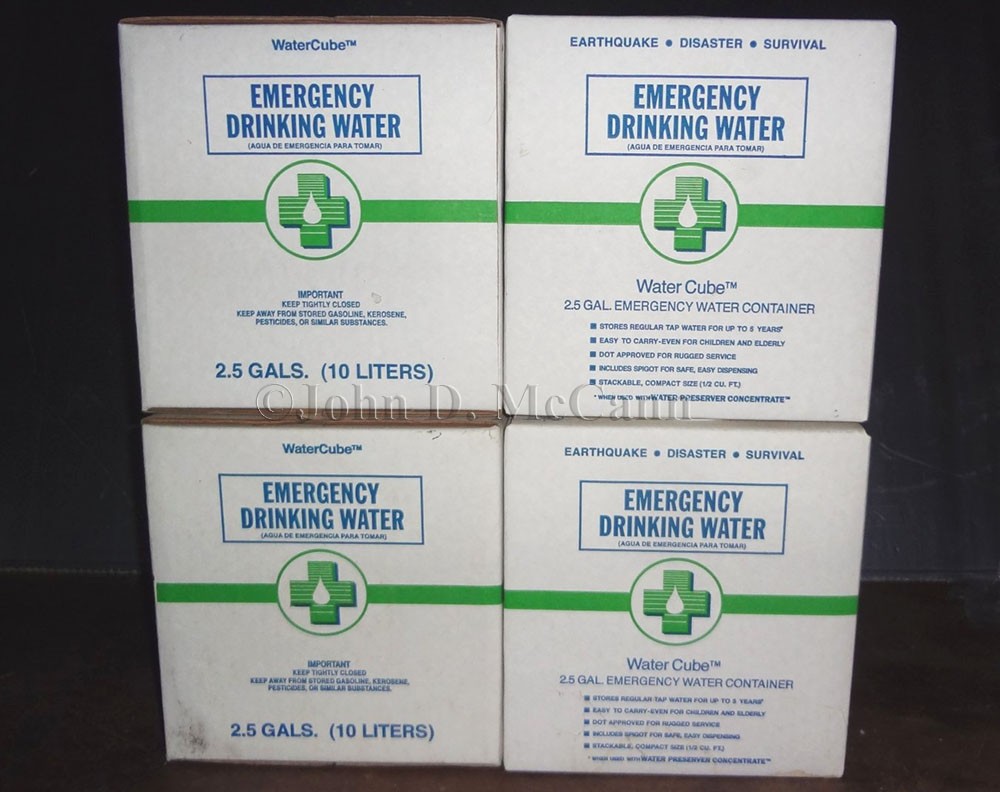 These are "Water Cubes" which we have used to store water. They are handy if you need to take some
These are "Water Cubes" which we have used to store water. They are handy if you need to take some
with you in an evacuation situation.
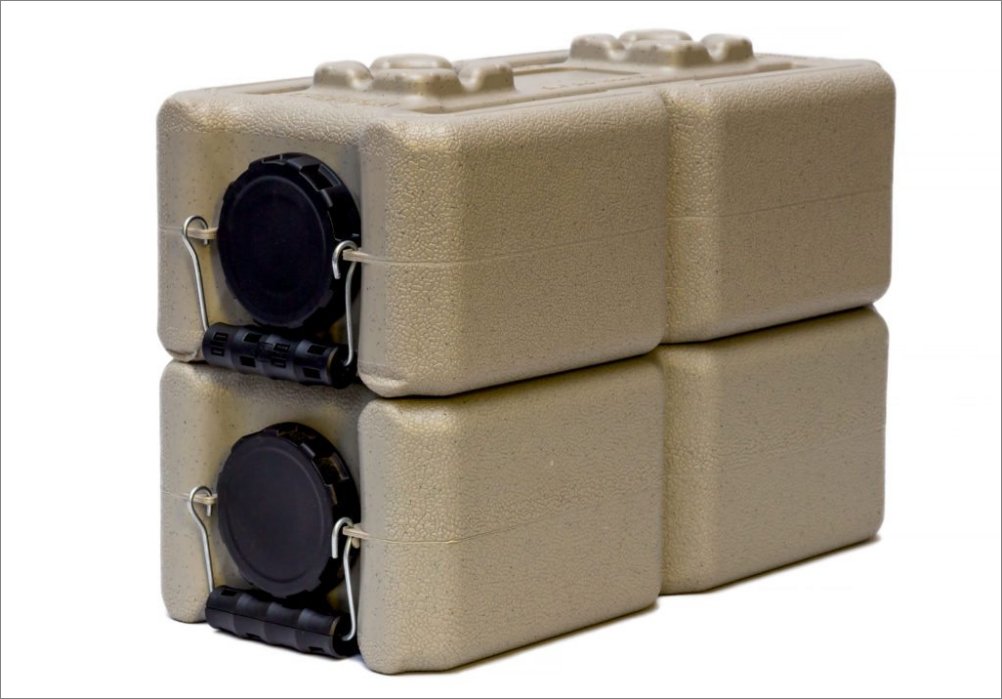 The "Water Brick is another item we have obtained for storing water. They are portable and lock
The "Water Brick is another item we have obtained for storing water. They are portable and lock
together when stacked.
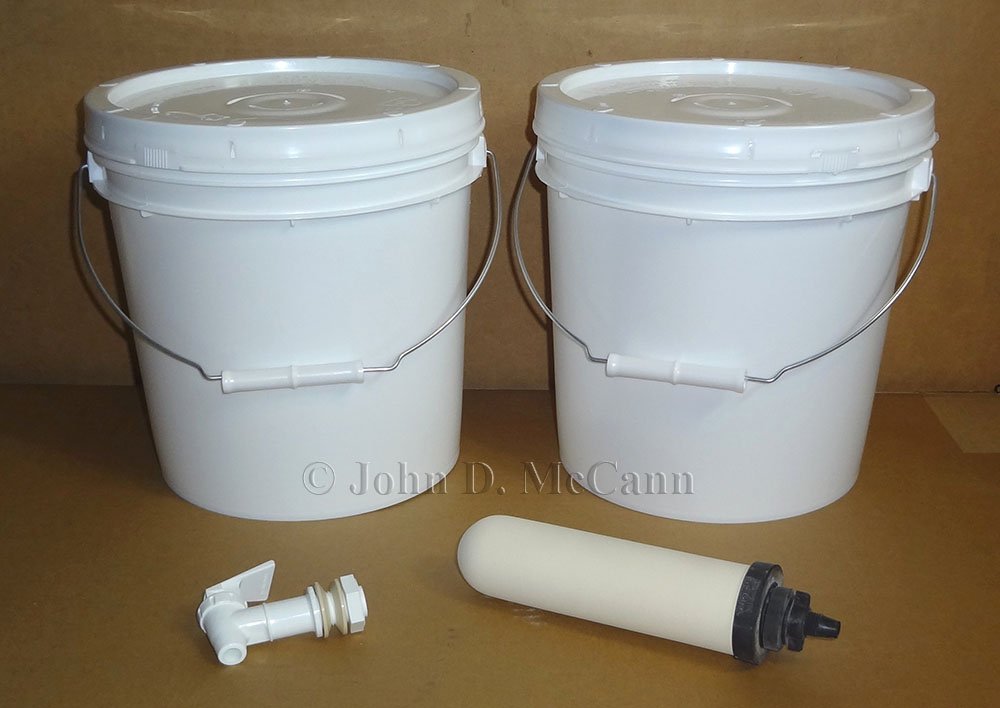 These are the minimal parts you need to make your own countertop water filter. See a link to
These are the minimal parts you need to make your own countertop water filter. See a link to
my DIY article above.
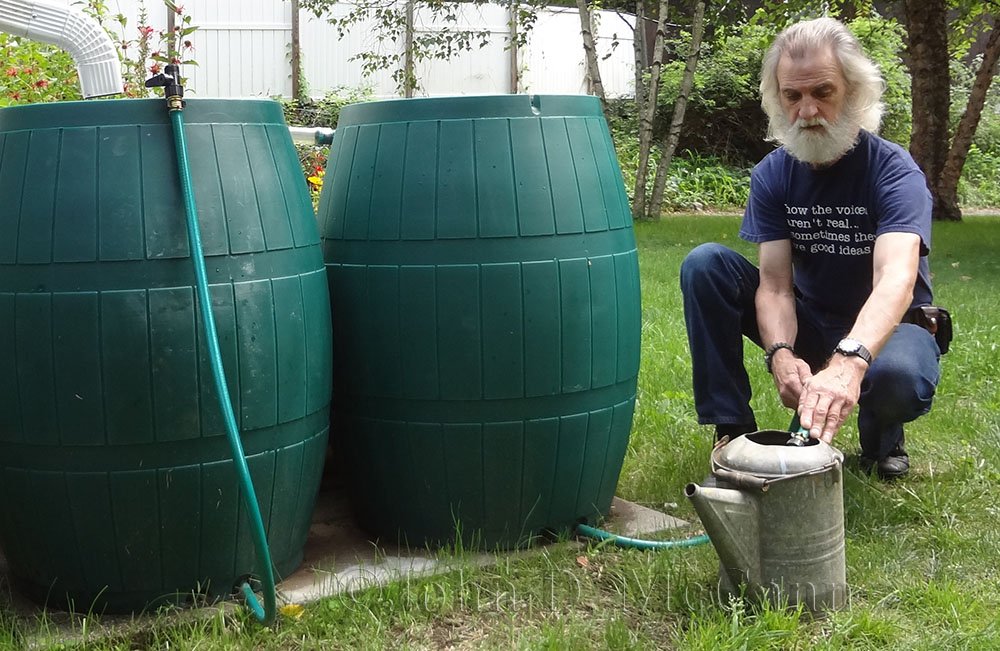 Water Barrels can collect rain water from gutters which can be used for various purposes in
Water Barrels can collect rain water from gutters which can be used for various purposes in
an emergency situation.
SUPPLIES YOU MIGHT CONSIDER
Let's discuss some of the items and supplies that people sometimes forget. Having the usual flashlight, bottled water, and a candle might get you through a bad day or night, but if the emergency lasts longer you might want to have supplies and items that can get you through, and make life more comfortable while you do so.
Have paper plates been put in the supplies along with eating utensils, so you don't have to waste water for cleanup? Do you have a coffee percolator that can be used over a fire? A coffee bean grinder? People put away canned goods, but do they have a manual can opener in the case there is no power?
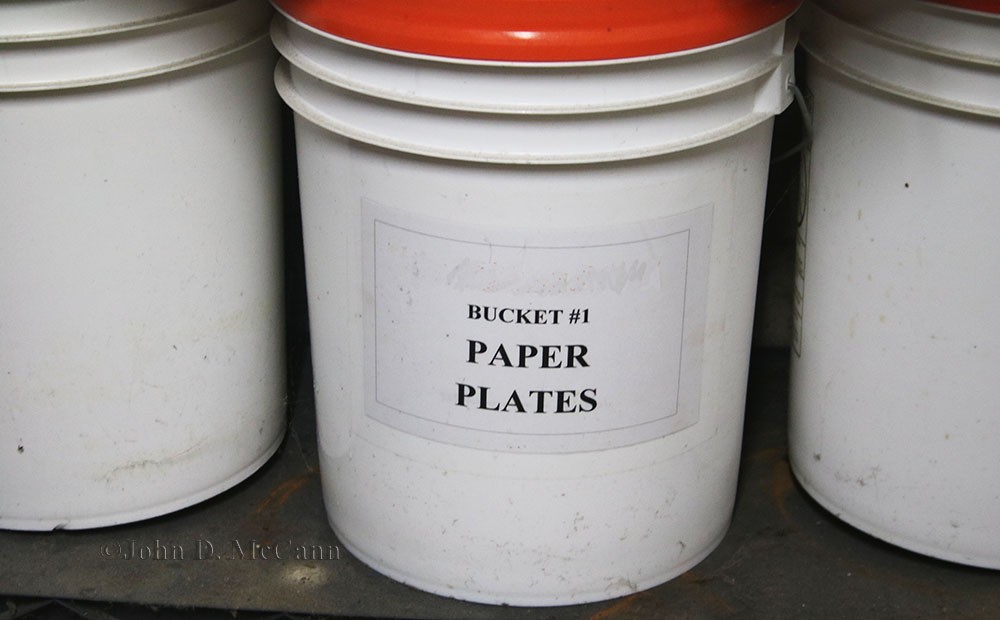 We keep a bucket of paper plates in the event of an emergency. You don't have to waste water to wash
We keep a bucket of paper plates in the event of an emergency. You don't have to waste water to wash
them and they can be burned after use.
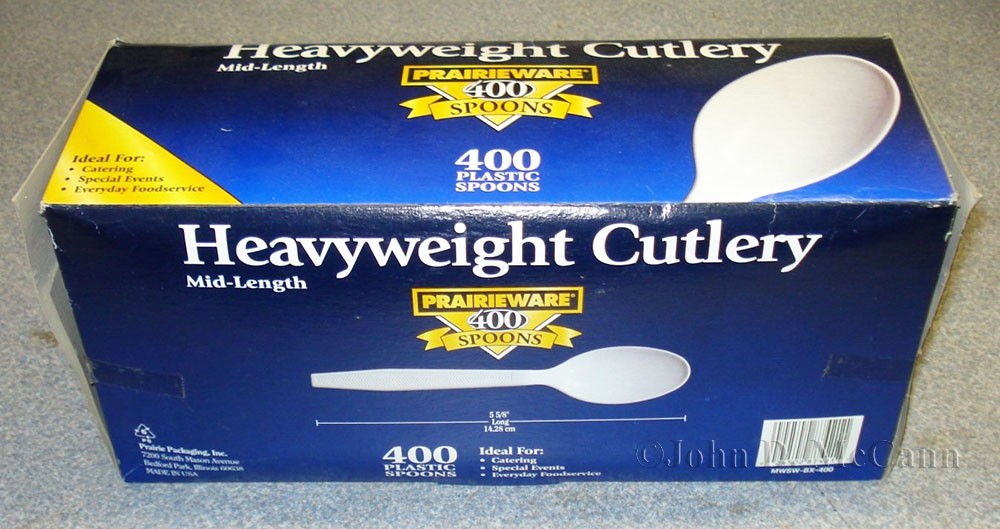 Disposable cutlery saves water because they don't have to be washed.
Disposable cutlery saves water because they don't have to be washed.
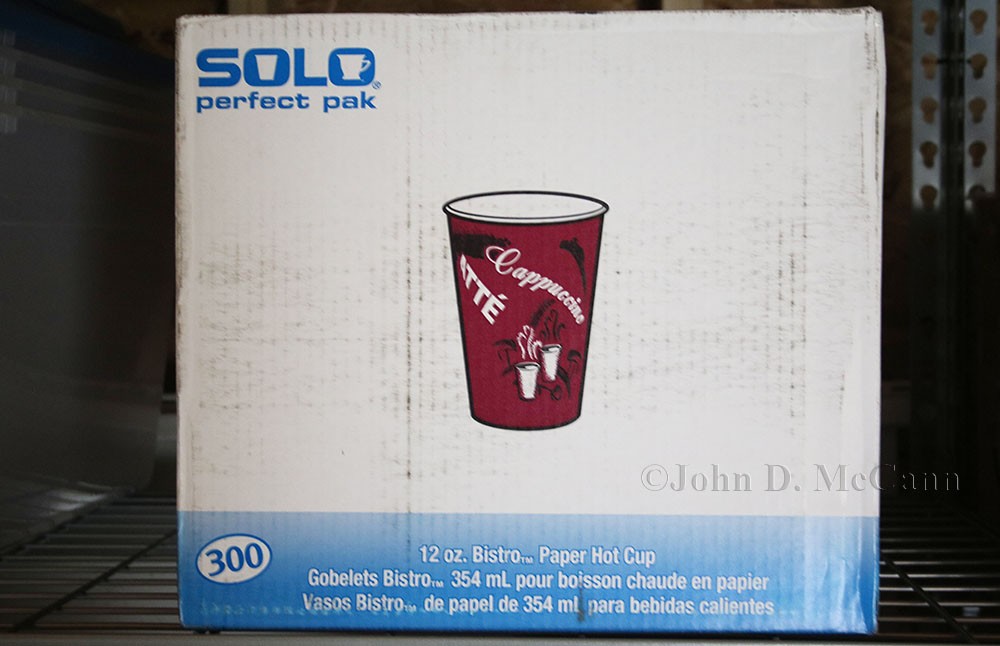 We keep a case of Hot/Cold cups for an emergency. They are great for coffee and can be burned after use.
We keep a case of Hot/Cold cups for an emergency. They are great for coffee and can be burned after use.
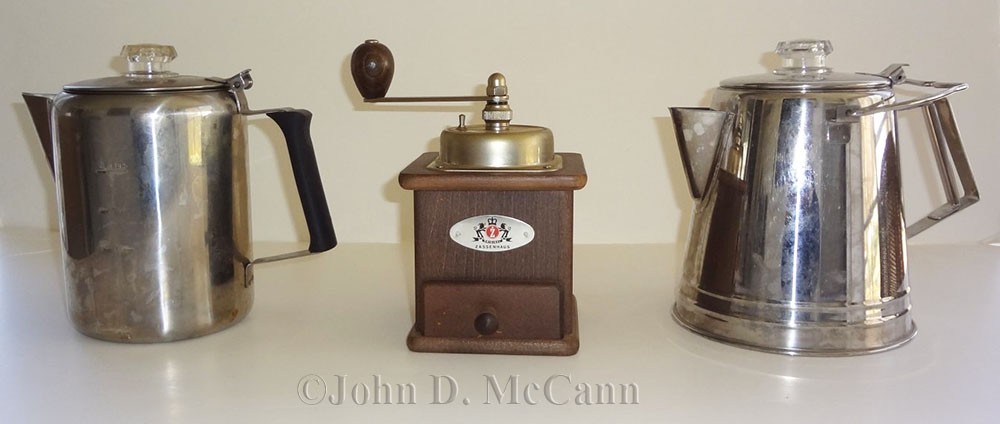 A coffee pot that can be used over a fire can come in handy. If you have coffee beans, a hand grinder is
A coffee pot that can be used over a fire can come in handy. If you have coffee beans, a hand grinder is
also a must when the power is out.
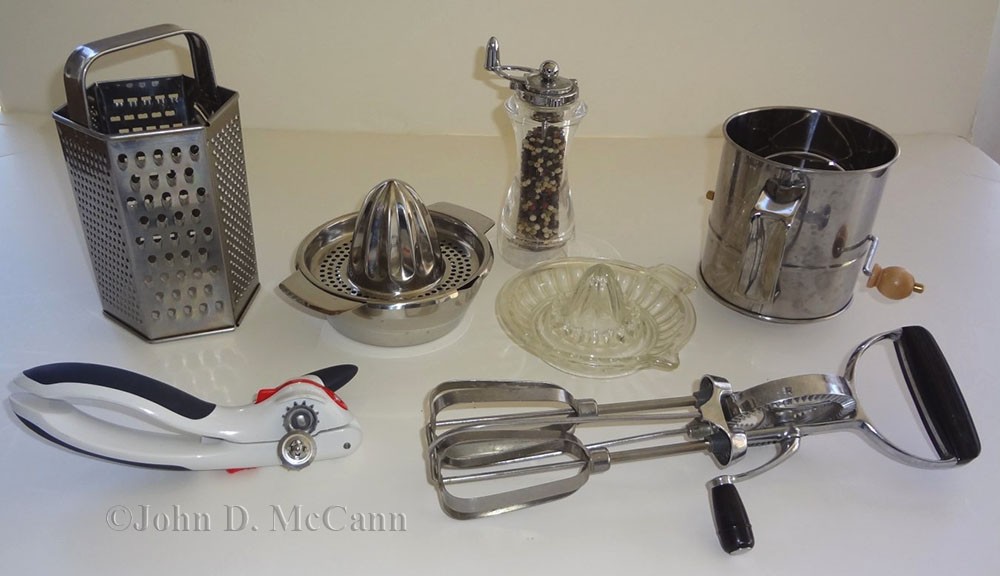 Manual kitchen aids are very handy when the power is out.
Manual kitchen aids are very handy when the power is out.
Do you have an alternate means in which to cook. A gas grill on the patio will come in handy but do you keep spare canisters of gas? Do you have some smaller stoves that can be used for a quick meal of cup of coffee? A solar cooker will provide you with a means to cook when the power is out and all you need for fuel is the sun.
 These are some of the camp stoves we have available for cooking in an emergency.
These are some of the camp stoves we have available for cooking in an emergency.
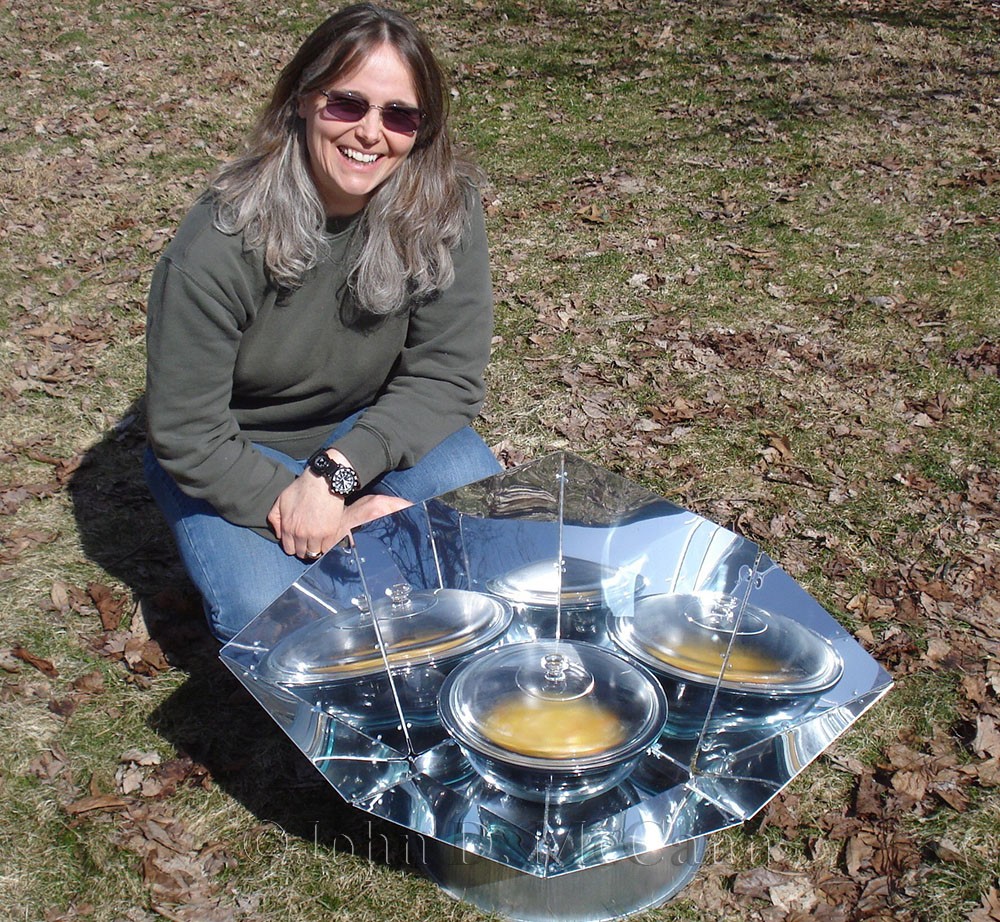 This shows my wife, Denise, using the sun as the fuel for cooking with out "Hot Pot" solar cooker.
This shows my wife, Denise, using the sun as the fuel for cooking with out "Hot Pot" solar cooker.
Once they eat, do they have a way of getting rid of what they ate? Did they include a portable toilet, chemicals for its use, and extra toilet paper? Is a solar shower in the supplies? Do they have an alternate supply for obtaining water, and a further means to purify it. Do they have an alternate way to cook? I asked some people how they will cook in an emergency and they said "No problem, we will use the barbecue grill." I asked how many extra canisters of gas they kept, and they said, "What?" Do they have a means to get rid of garbage? A burn barrel setting in the garage, just in case. Do they have a compost pile? These are all things to consider.
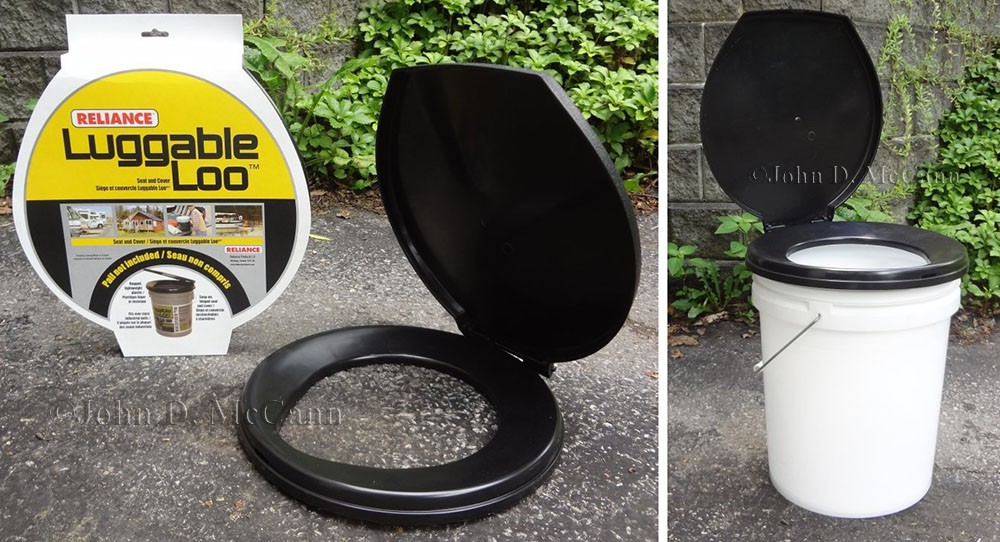 A Luggable Loo and Five Gallon Bucket makes a quick portable toilet.
A Luggable Loo and Five Gallon Bucket makes a quick portable toilet.
For light, some people put away some candles, and maybe an oil lantern. But have they put away extra lamp oil, wicks, or matches to light them? Light is essential and flashlights are a good idea, but a head lamp frees your hands and allows you to perform your required tasks unencumbered. Of course, if you will rely on these lights, you should have plenty of extra batteries stored, or a way to recharge them. I did an article awhile back called "Simple Solar" which shows how to recharge AA batteries using landscaping lights. To see that article click HERE.
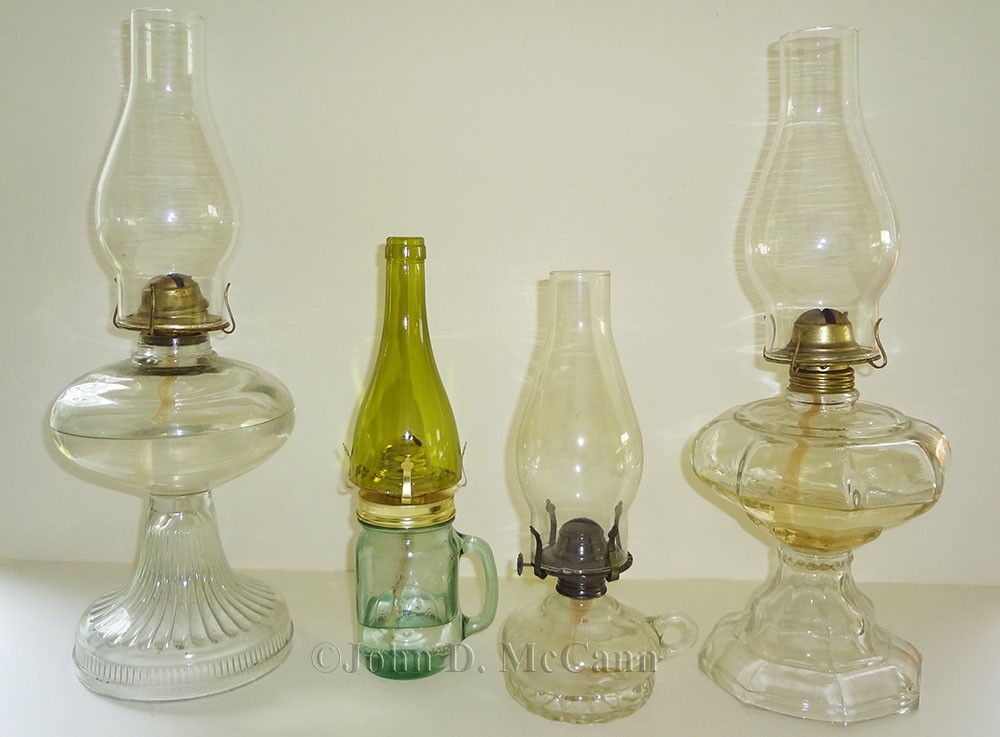 Glass Oil Lamps are handy but should be supervised. These are few from our collection.
Glass Oil Lamps are handy but should be supervised. These are few from our collection.
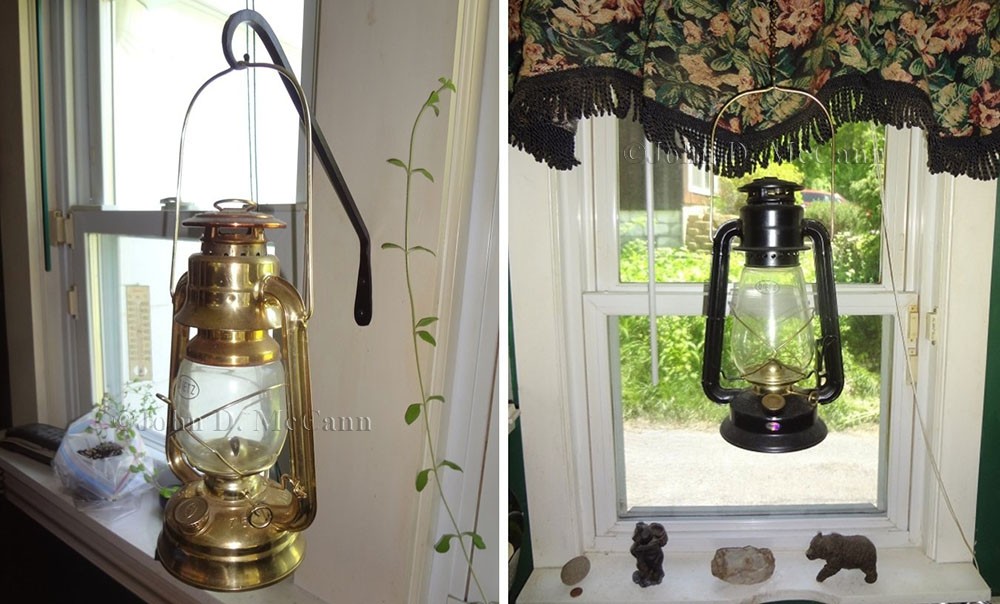 Oil lamps hung in convenient locations make them handy when needed.
Oil lamps hung in convenient locations make them handy when needed.
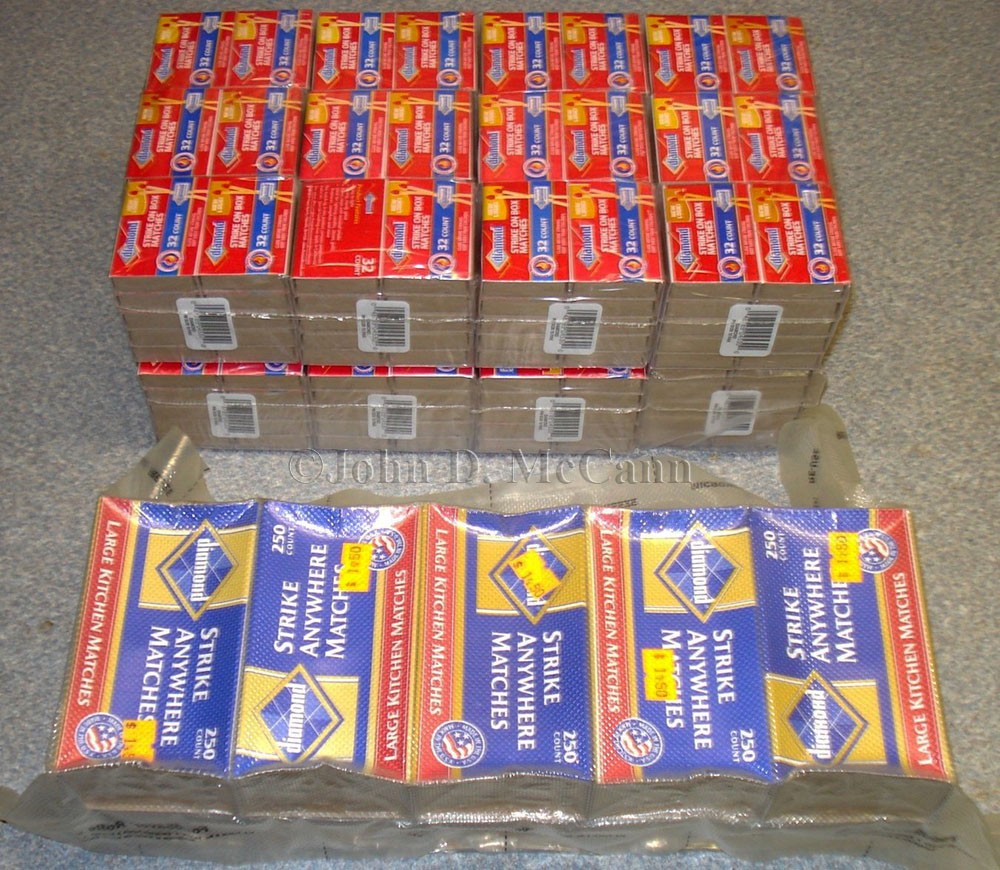 A good supply of matches will always come in handy.
A good supply of matches will always come in handy.
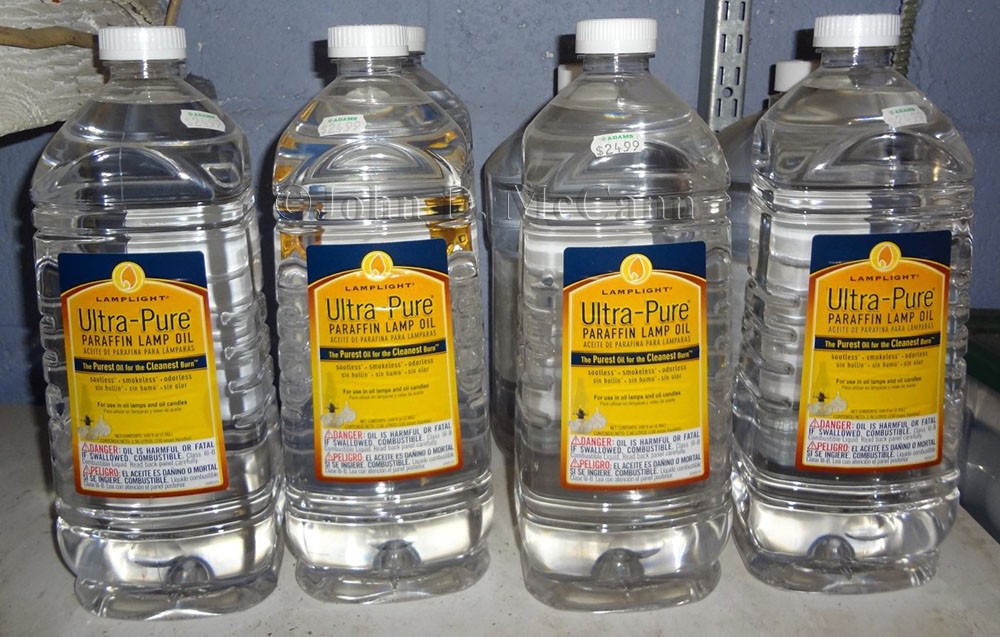 If you will depend on oil lamps or lanterns, have a good supple of extra lamp oil.
If you will depend on oil lamps or lanterns, have a good supple of extra lamp oil.
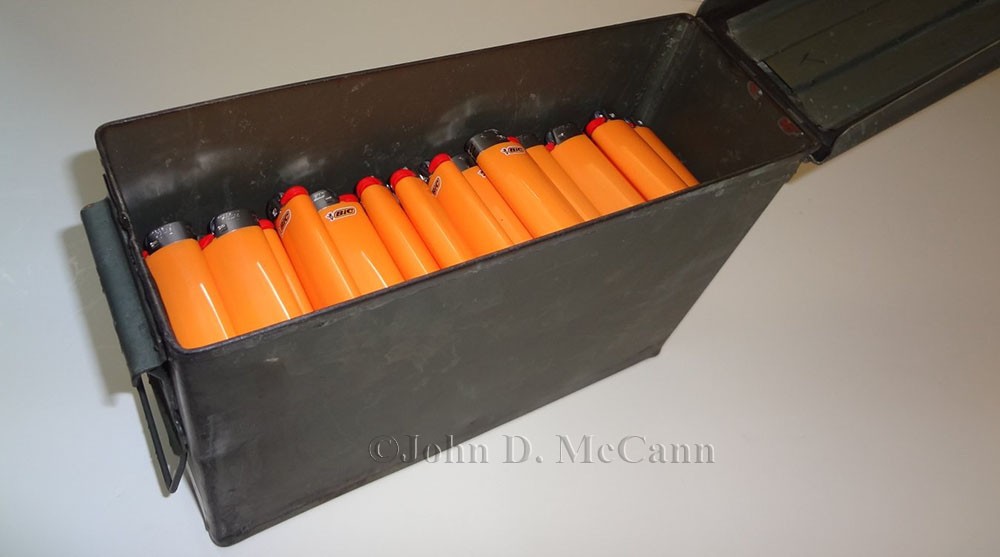 BIC Lighters are a great emergency item for starting fire and are great for bartering. We keep a good
BIC Lighters are a great emergency item for starting fire and are great for bartering. We keep a good
supply in an ammo can.
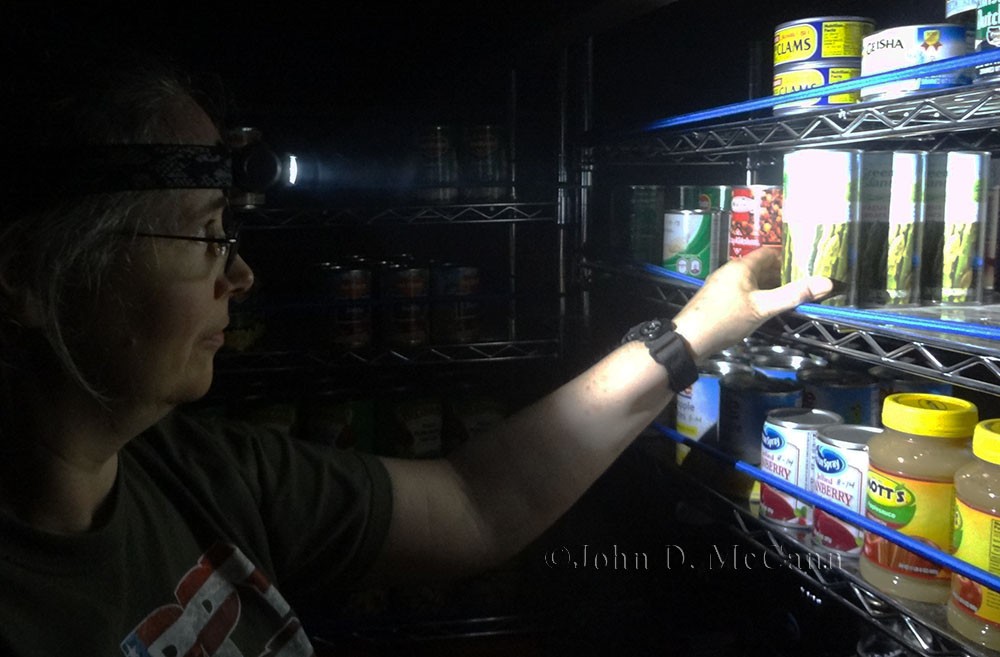 A good headlamp provides for "Hands Free" use provides you with both hands to complete tasks.
A good headlamp provides for "Hands Free" use provides you with both hands to complete tasks.
Some people start putting away tools, just in case. I highly recommend that, but do they have the skills to use them effectively? How-To-Books are a good source for any home library.
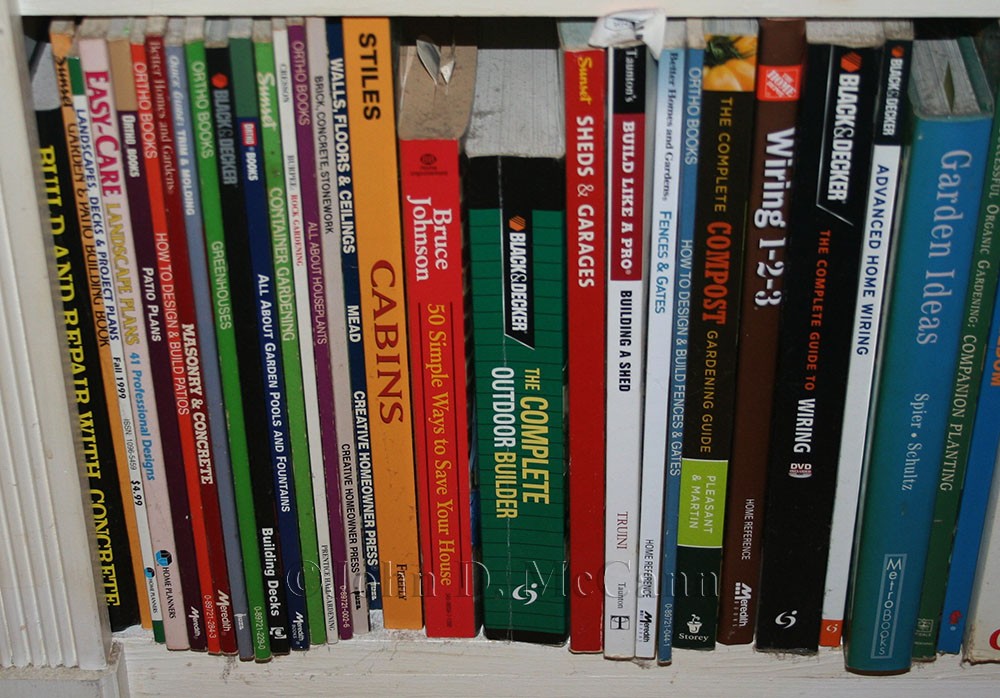 A good collection of How-To books can come in handy in an emergency.
A good collection of How-To books can come in handy in an emergency.
People garden, and this is a good way to bring in extra food. But do they use heirloom seeds, so they can have a garden the following year? People who can their own food might have an extra supply of new jars, but did they put away a large supply of extra lids? They are required when you go to re-can with an old jar.
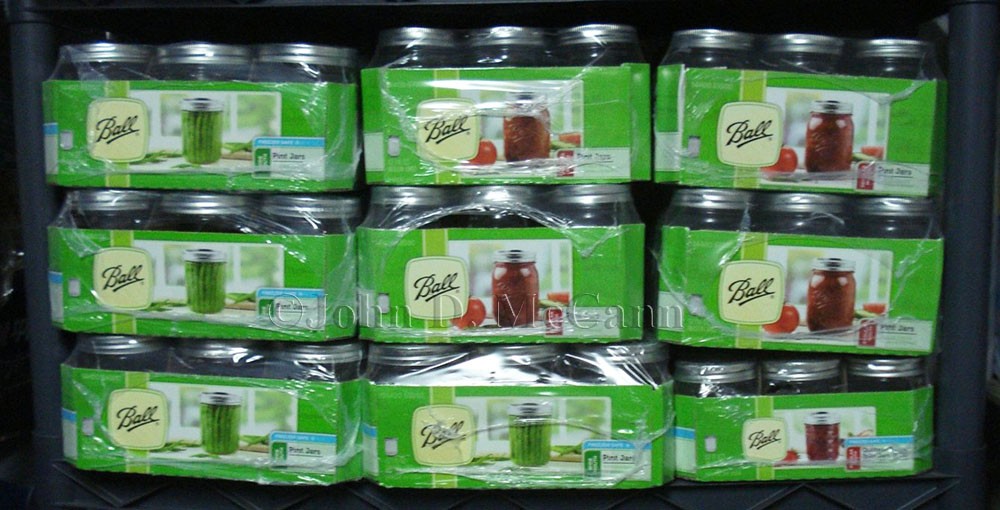 A good supply of canning jars is a must if you do canning from your garden.
A good supply of canning jars is a must if you do canning from your garden.
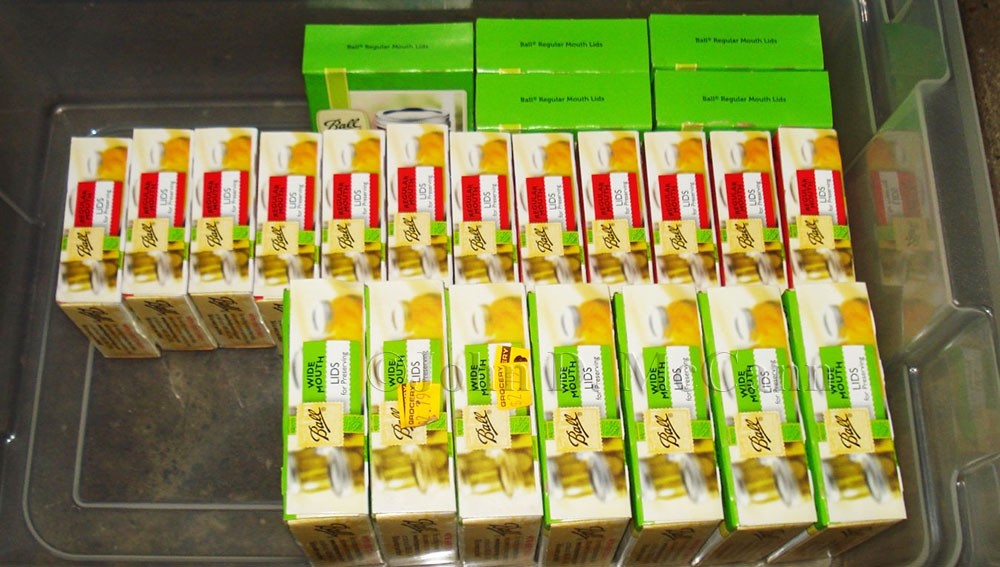 If you do canning, make sure you keep a good supply of extra lids!
If you do canning, make sure you keep a good supply of extra lids!
Paper goods such as toilet paper, as mentioned above, as well as a good supply of paper towels, garbage bags, contractor bags, zip-lock bags, etc., are handy for various purposes.
 Extra trash and zip closure bags, as well as paper towels and toilet paper are a must.
Extra trash and zip closure bags, as well as paper towels and toilet paper are a must.
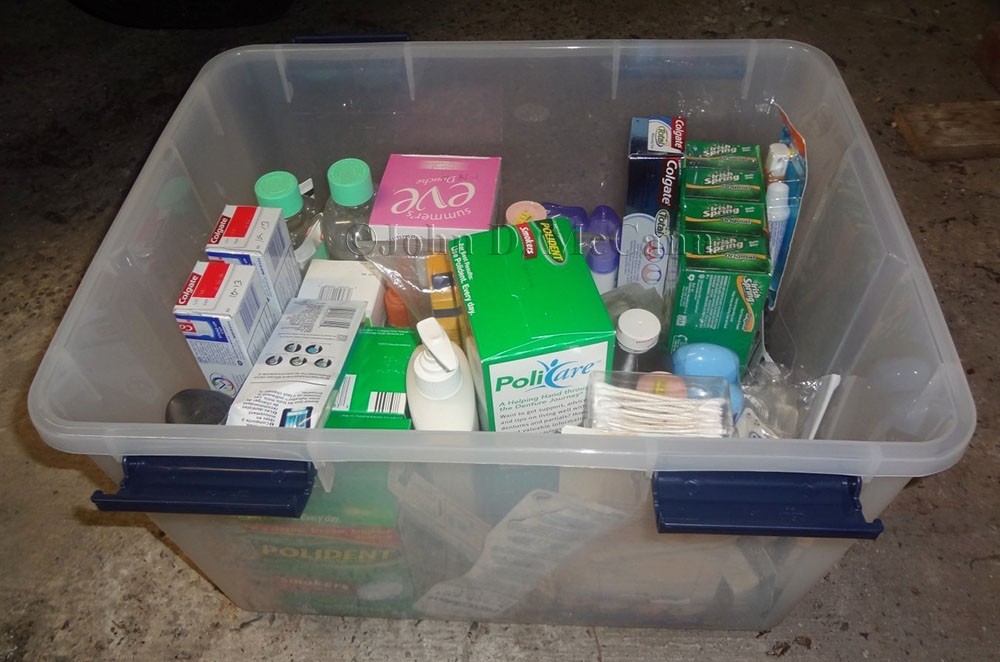 An extra supply of toiletry items can be stored in a plastic bin with a locking sealed lid.
An extra supply of toiletry items can be stored in a plastic bin with a locking sealed lid.
Do you have a way to stay clean? A portable solar camp shower is handy as you can hang it outside during a sunny day which will heat up the water. You can then bring it into your bathroom and shower in comfort.
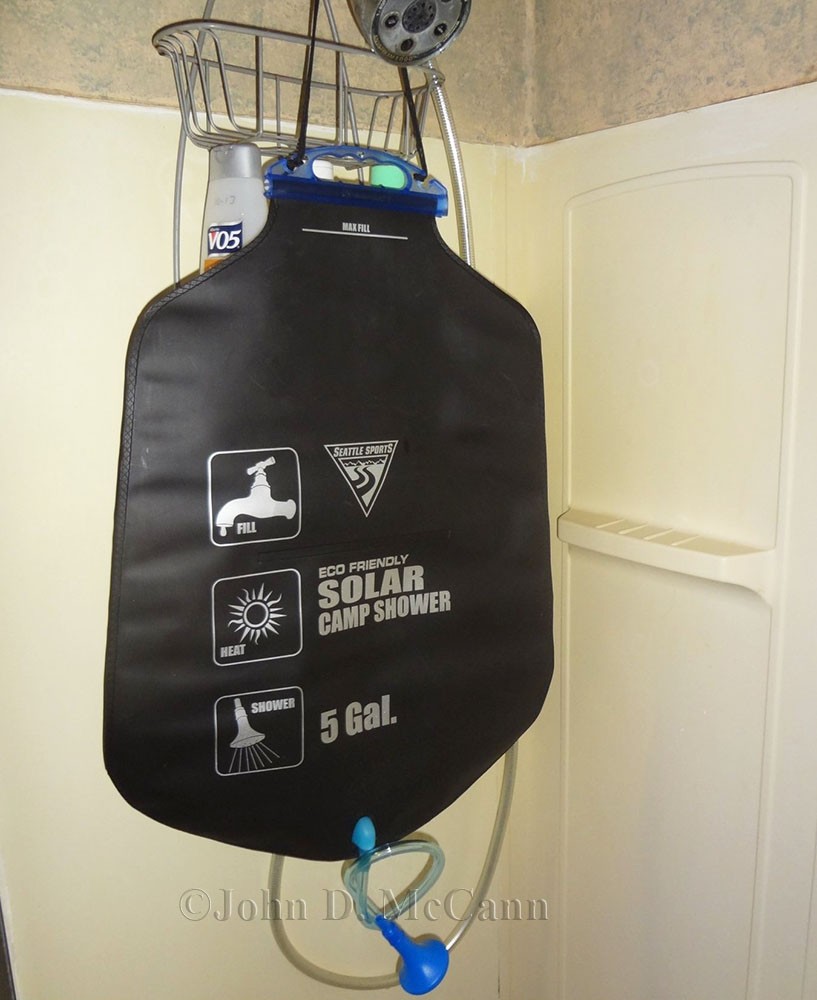 Heat the water by hanging the solar shower in the sun, then bring it in when
Heat the water by hanging the solar shower in the sun, then bring it in when
you want to shower.
Pantries are a valuable asset in an emergency situation, but how many people really get serious about it. They may think because the cupboards are full, they are set. How much of that stuff is filler, and how much is real food? How many actual meals can they make?
Pantries can be placed in various location at the home. I have even used the space going up the stairs from the cellar for both a pantry and emergency supplies. The are very handy to get to by simply opening the cellar door.
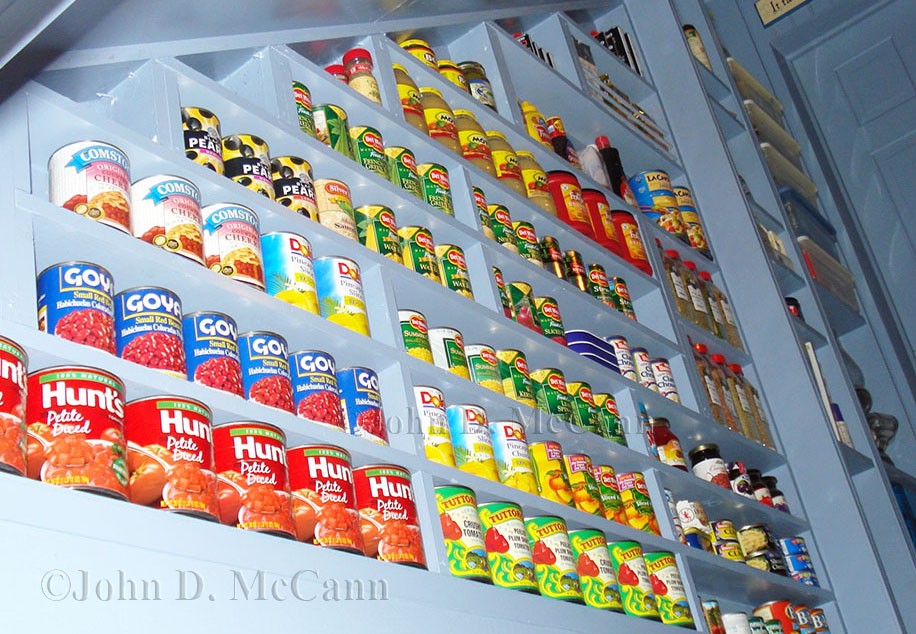 A view looking up from the cellar at a pantry I built alongside the stairs. Emergency supplies are at top.
A view looking up from the cellar at a pantry I built alongside the stairs. Emergency supplies are at top.
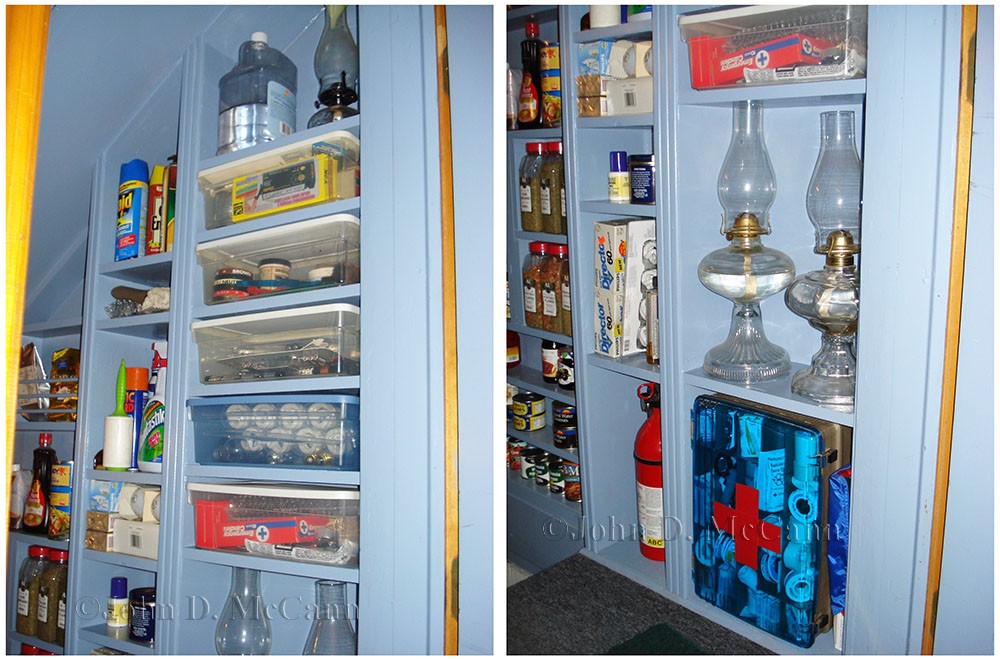 The left photo shows the top portion of the emergency supplies section, and the right photo the bottom portion.
The left photo shows the top portion of the emergency supplies section, and the right photo the bottom portion.
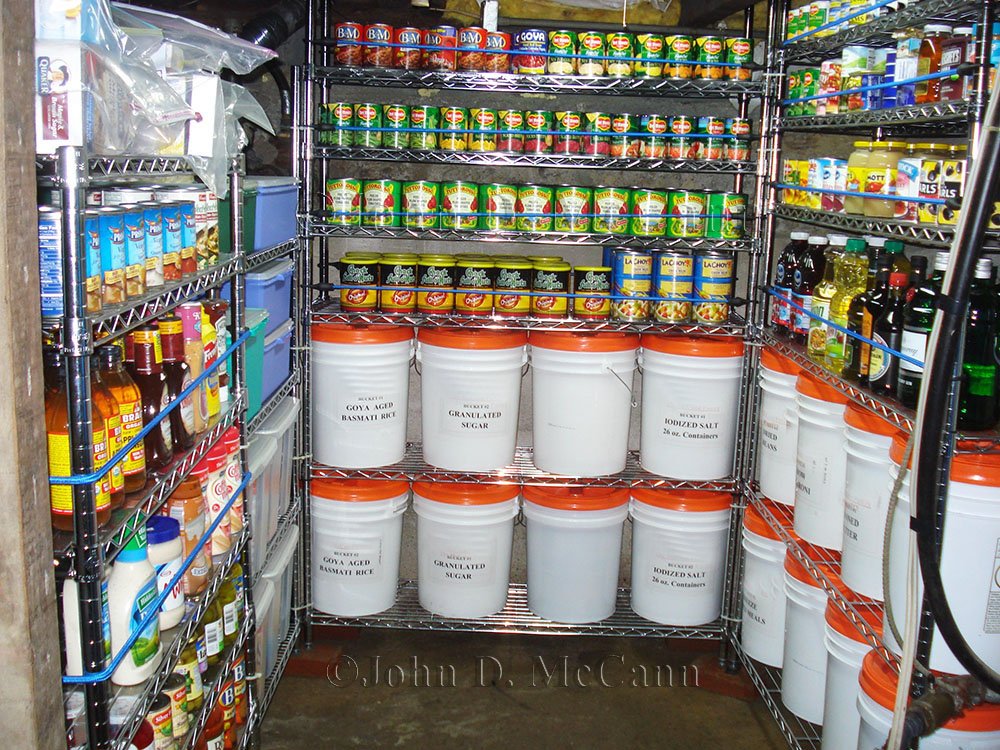 A well supplied pantry, with more than freeze dried food allows you to eat what you are used to,
A well supplied pantry, with more than freeze dried food allows you to eat what you are used to,
but you must store what you use and use what you store. Rotation is important.
If you can't get out, do you keep a well supplied first aid kit? I prefer one that is portable so it can be brought to the injured party if necessary. Do you have extra medications? If you wear glasses, do you keep an extra pair on hand in the event you primary pair gets broken?
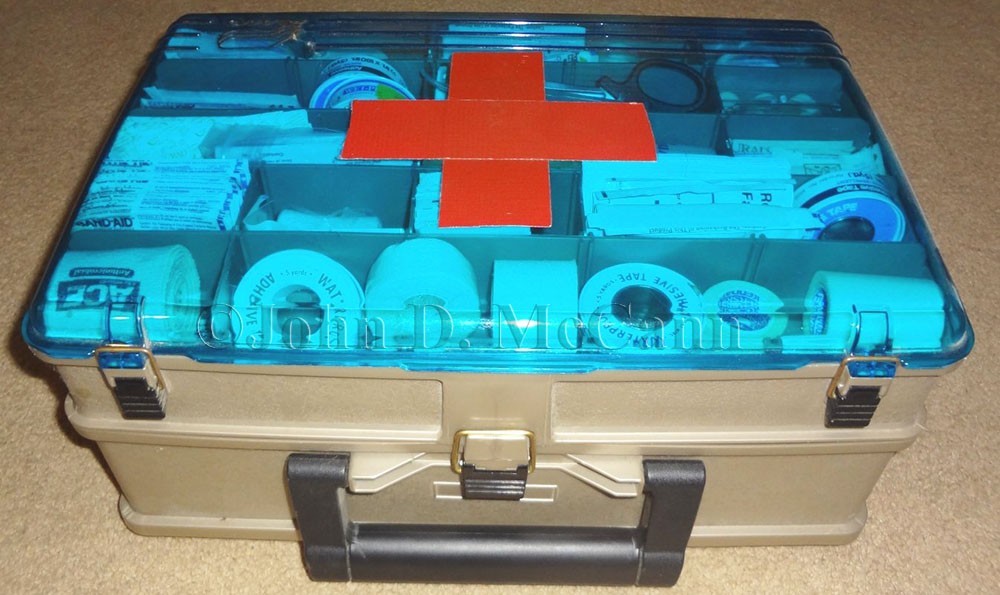 A well equipped portable first aid kit can help when medical services are not available. We built our
A well equipped portable first aid kit can help when medical services are not available. We built our
first aid kit in a large tackle-type box so that it can easily be carried to the victim of the emergency.
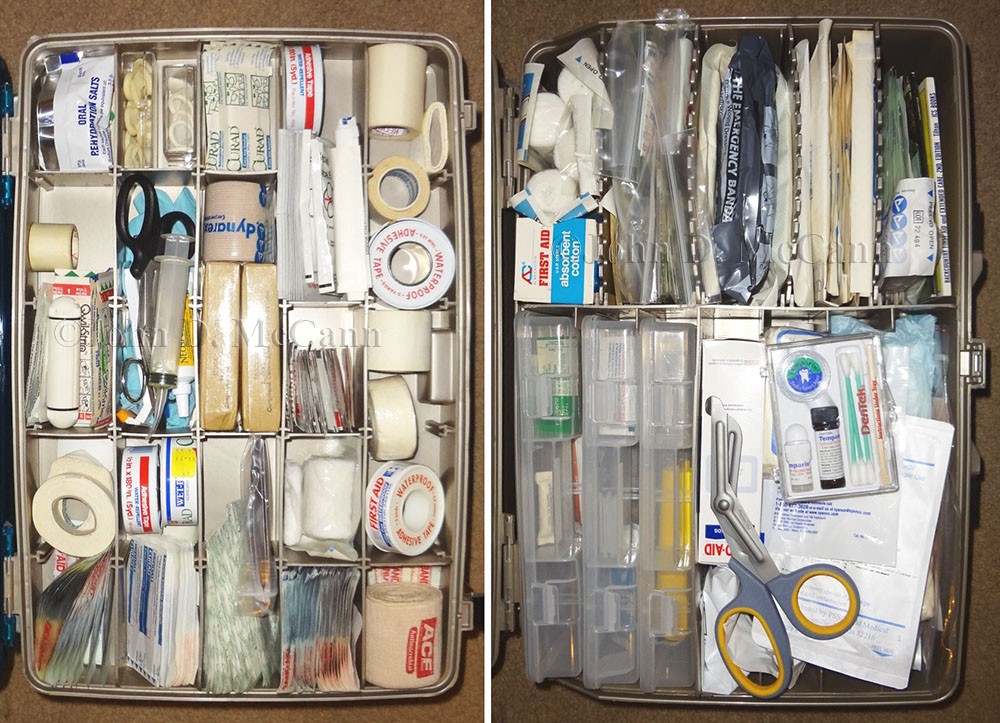 The first aid kit is set-up in different layers holding various types of first aid equipment.
The first aid kit is set-up in different layers holding various types of first aid equipment.
Of course if you live an area that gets cold in the winter, heat will be an additional concern. I have a generator that keeps my furnace going, but you are limited by the amount of gas you store. We only turn on the generator in the morning to take the chill off the house and run the water pump. We have a gas water heater, so all we have to do is get the hot water to the shower and then we wash dishes. We then turn the generator off. We might turn it on again for a short period to reheat if the house is that cold. We have gone three or four days only using five gallons of gas.
If you don't have a generator, a good wood stove is a great part of a survival strategy. Of course, you should keep a supply of wood for an emergency. If you are not lucky enough to have a wood stove, there are other options. For short term, I like the Mr. Heater "Big Buddy" propane heater which runs off of two Coleman propane canisters. With proper ventilation, it can be used inside the house as an emergency heat source. It won't heat the whole house, but can keep a room warm for you. Of course you should store extra propane canisters if you need to use it for any length of time.
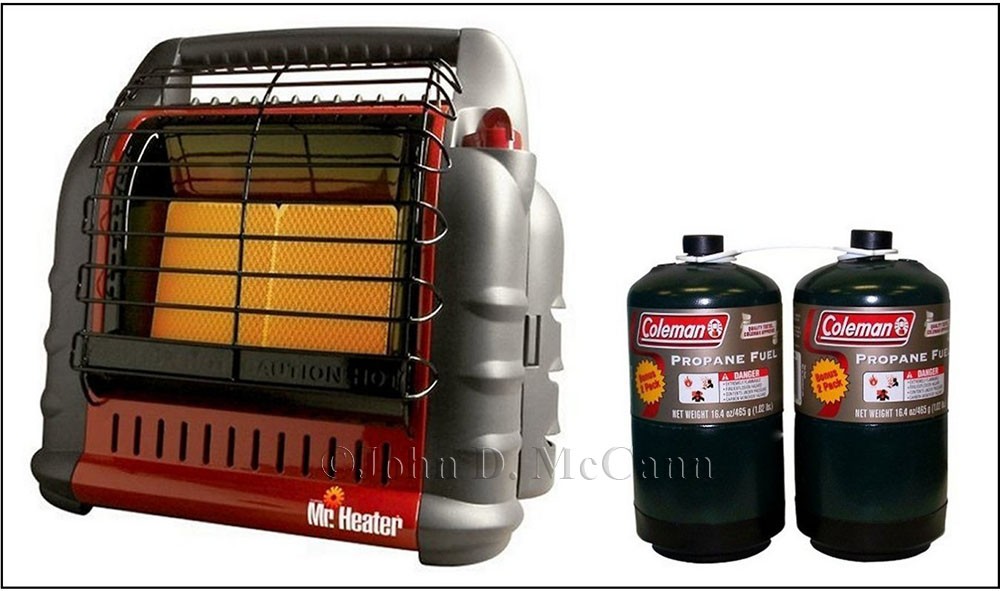 The Mr. Heater "Big Buddy" propane heater can help keep you warm.
The Mr. Heater "Big Buddy" propane heater can help keep you warm.
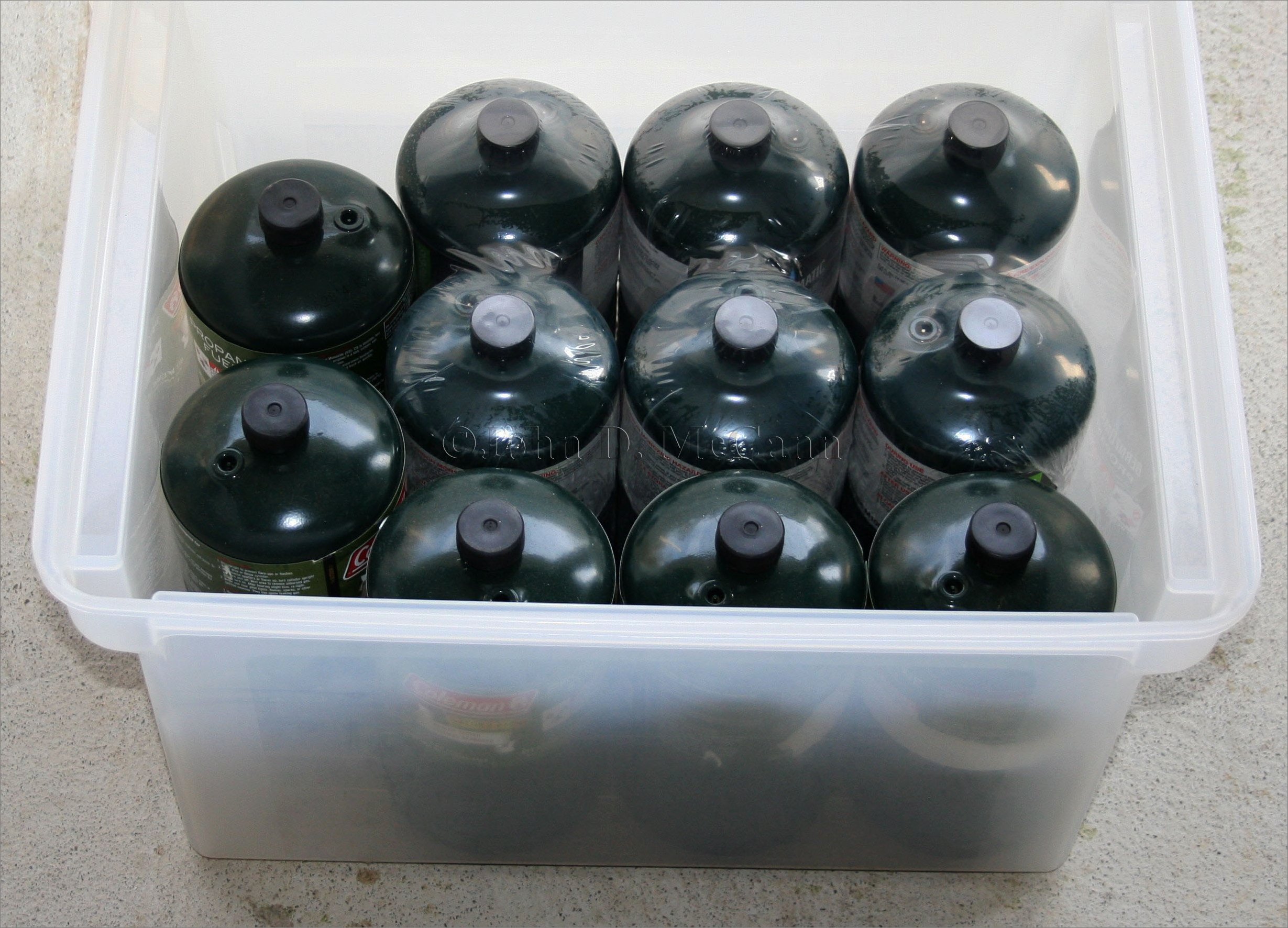 A good supply of extra propane canisters are a must if you need to use the "Big Buddy" for any length of time.
A good supply of extra propane canisters are a must if you need to use the "Big Buddy" for any length of time.
If a situation lasts more than a few days, you might consider a way to wash and dry clothes. I did an article awhile back showing how to make a clothes washer with a five gallon bucket with lid, and an old toilet plunger with holes drilled in it. If you are interested in that article, you can see it HERE. If you have to dry clothes without power, you might consider an outdoor collapsible umbrella type clothesline for nice days, and a collapsible folding floor dryer for in the house on inclement weather.
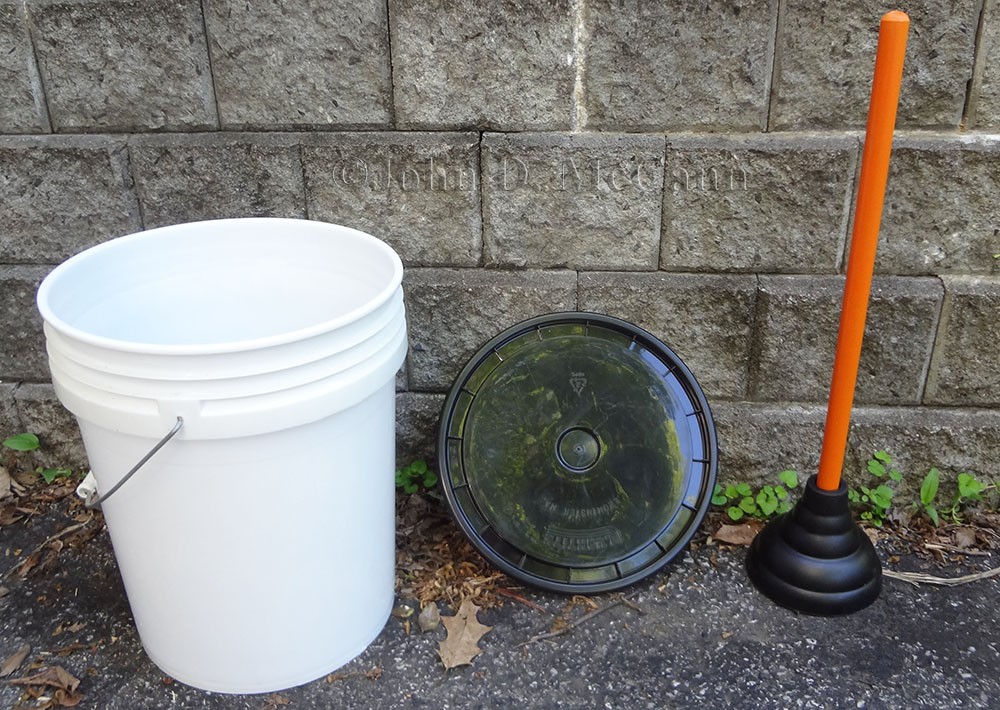 A clothes washer can be made with a 5 Gallon bucket, lid, and old toilet plunger.
A clothes washer can be made with a 5 Gallon bucket, lid, and old toilet plunger.
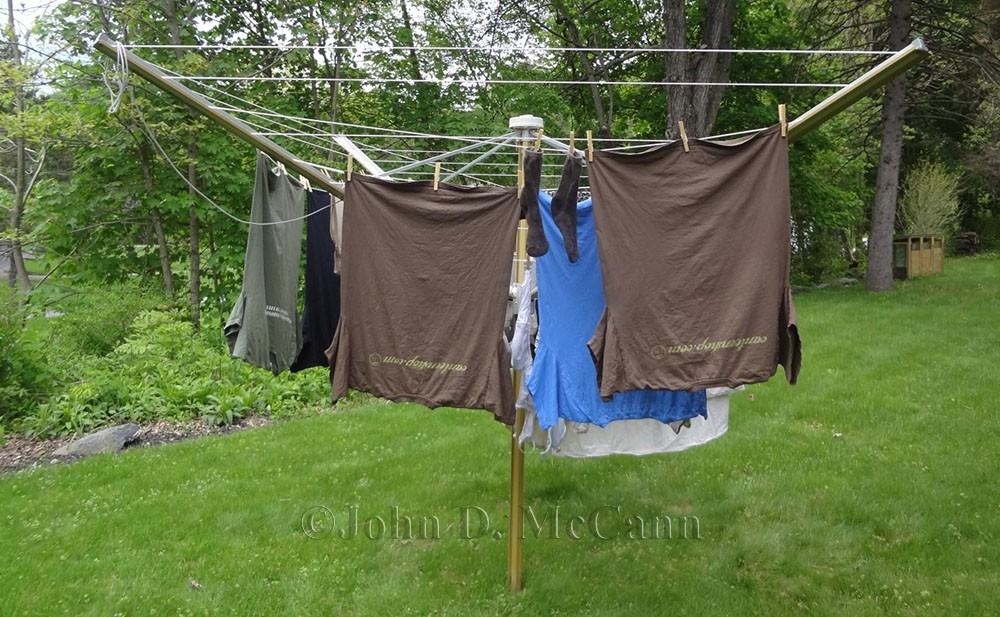 An outdoor collapsible umbrella type clothesline is handy for drying clothes on nice days.
An outdoor collapsible umbrella type clothesline is handy for drying clothes on nice days.
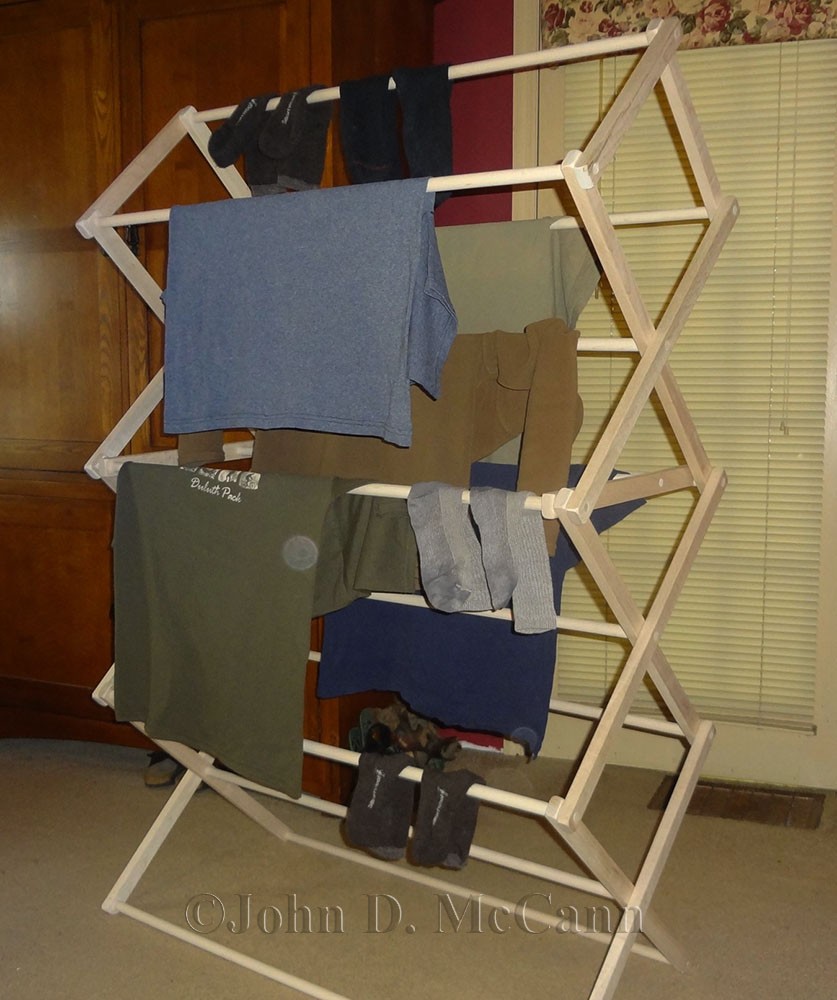 A collapsible folding floor dryer is handy for drying in the house during inclement weather.
A collapsible folding floor dryer is handy for drying in the house during inclement weather.
Emergency communications are another important part of being prepared. Having radios which allow you to collect news, as well as radios that allow you to communicate with one another, are essential. I did an entire article on "Emergency Communications." If you are interested, you can see it HERE.
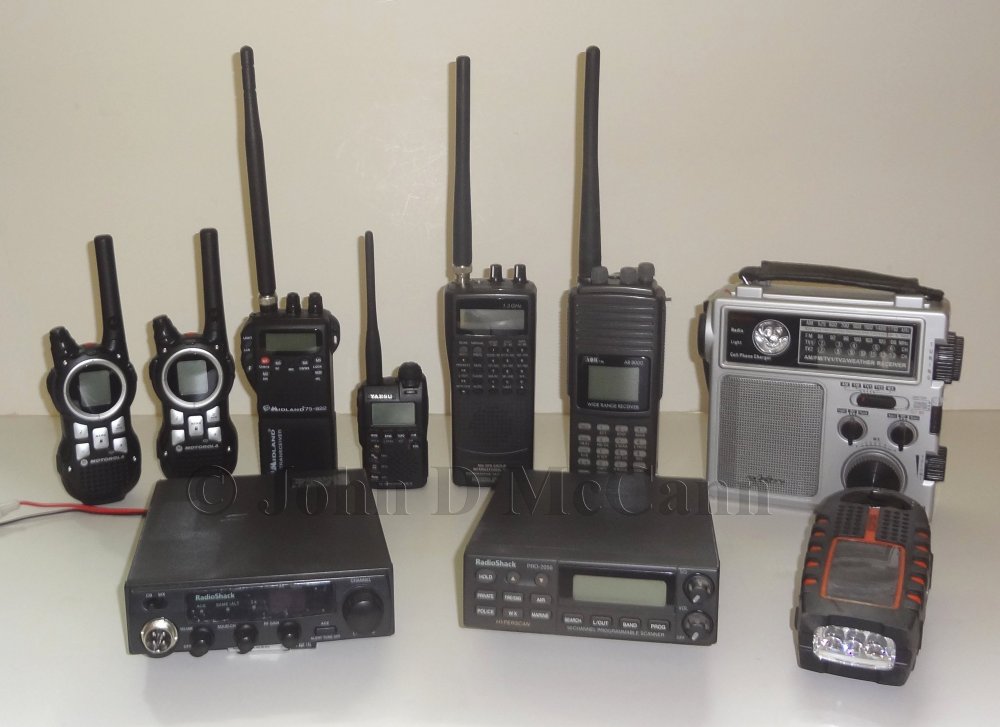 Communication is important in an emergency, from collecting news to staying in touch.
Communication is important in an emergency, from collecting news to staying in touch.
Are people ready to protect and defend what they have, and are they willing to? This doesn't just include those who wish to takes what is yours, but are they prepared for fire? Are there fire extinguishers staged throughout the house? If they have to leave, evacuate, bug-out, do they have a pre-arranged plan as to where they are going? Do all family members know, and do they have the bare essentials stored in their vehicles, or will they all have to return home to get them?
Of course, this is not an inclusive list of everything that could be stored for an emergency. These are just some simple examples, but they should make you look at your survival strategy. Think past the immediate needs, and think about sustaining those needs. A situation may last longer than you planned for. Supplies are good, and important, but they are not a panacea to an emergency or survival situation. So let's look at the other variables.
I believe that you need a survival mind-set. An understanding of what could actually occur and how you plan to deal with that situation. Are you practiced at a real situation? Have you ever turned off all your support (electric, gas, water, heat, etc.) for just a weekend? This type of practice exercise can really identify holes in your plan. You might learn some interesting things that you hadn't thought of.
I recall going without electric at my home for several days (happens a lot here). A neighbor asked, "So how are you making out. Don't you find it difficult?" I asked, "Why, has something happened?" He said, "We have been out of electric for days!" I said, "Gee, I didn't notice").
This was my wife's and my mind-set. We just thought it was an inconvenience, but not an emergency situation. We are practiced at what we do. We keep adding to our abilities. A little more of this here, a little more of that there, add another solar panel, etc. But it is the mental attitude, the survival mind-set, and the skills that we practice, that give us our comfort zone. There is a popular country song called "Trailer hood", and there is a part that says, "When the storm starts getting bad, you hear those sirens humming, grab a six pack and a lawn chair, there's a tornado coming." Now that's a positive mind-set!
We hope you enjoyed this article and will help support our efforts by checking out our products. As always, Be Prepared To Survive!
Copyright © 2017 by John D. McCann


